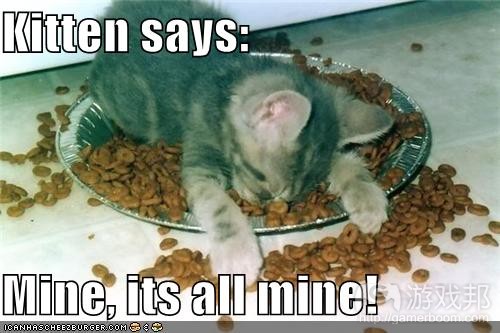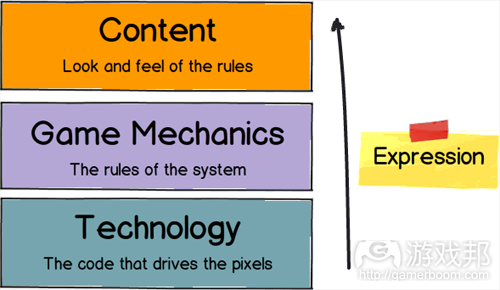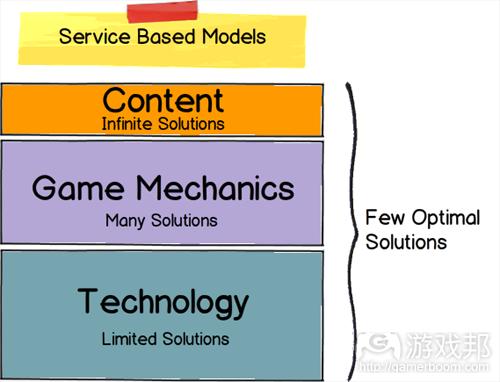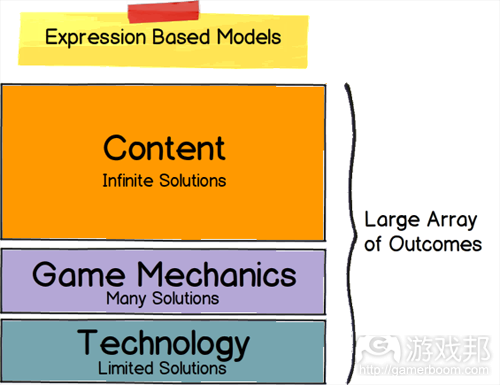从基于表达或服务的创造模式看游戏山寨现象
作者:Tommy Wu
独立游戏开发商FableLabs在能够自主创造游戏之前也借鉴了许多前人的理念。我们起初只是想利用别人的理念并添加我们自己的想法而创造出完全不同的产品,但是话说回来,这不正是游戏产业中所有人的想法吗?在这个产业里,模仿行为的存在已经有一段时间了,尽管有人预见随着游戏难度的增加,模仿行为将会逐渐减少,但是最近却仍涌现出一些关于游戏克隆的诉讼案件,分别是来自Spry Fox,Buffalo Studios和NimbleBit。
我开始好奇创造者是如何看待灵感与复制之间的矛盾,以及我们该如何为自己迈进这一“灰色地带”找理由。为什么同样是模仿游戏,《愤怒的小鸟》(游戏邦注:仿效了《Crush the Castle》)获得了大多数开发者的赞赏,但是《Dream Heights》或《YetiTown》却遭到了众人的轻视?更重要的是,我们应该如何保护自己的游戏和IP?
用户并不关心发明者(他们所在乎的是表达)
上图是两位对人类社会做出巨大贡献的人(游戏邦注:他们在同一个月离世),乔布斯是众所周知的名人,而Dennis却始终默默无闻(仅有一小部程序员获知他的死讯)。用户不会去关心什么是C++,他们只在乎这种语言是如何呈现在自己眼前。他们并不在乎Palm创造了智能手机类型,他们关心的是乔布斯以及苹果是如何将智能手机表达方式发挥到极致并广泛普及。
单纯的发明并不能直接影响用户,能够改善人们生活的通常是多个发明的合体。对于游戏来说亦是如此,玩家并不关心是谁提出了一个新的游戏机制,他们只在乎游戏是如何表达这种游戏机制,并且谁能够实践这些机制。
玩家并不关心自己是如何获得游戏
现在你已经创造了一款具有吸引力的游戏,并且你能够独立控制这款游戏。除此之外你也已经证实了目标市场的合理性——这是最具有挑战性的一部分。那接下来呢?你要清楚用户希望你能够马上为其呈现最佳游戏版本,并且让他们能够以最低价格享受游戏。
也许这一刻玩家还在为你的游戏欢呼,但下一秒如果出现了其它能够吸引他们的新游戏,他们便会毫不留情地抛弃你辛苦创造出的产品。这些玩家不知道你进行了多少测试才完成这款游戏,不知道你创造了多少纸上原型才最终证实了自己的理念,也不知道你在游戏内容/发行商身上投入了多少成本才能最终发行游戏,且更重要的是,他们甚至根本不想知道这些过程。
玩家并不关心:
《黑帮战争》模仿了David Maestri的《Mob Wars》
《FarmVille》模仿了Slashkey的《Farmtown》
《Words With Friends》模仿EA/Hasbro的《Scrabble》
《亚瑟王国》在Facebook平台上模仿了《Evony》
《愤怒的小鸟》只是将《Crush the Castle》改头换面
用户也许会在渴望拥有最棒的游戏体验与奖励创造者之间感到矛盾,但是不管怎么样,他们永远会将自己的利益摆在首位。我们希望论坛上的所有玩家能够更深刻地体谅我们作为开发者的苦心,并给予我们更多时间去编写功能,修改漏洞并平衡游戏玩法,但是我们却在此看到了各种对于游戏的抱怨,包括1)太贵了,2)太不稳定,以及3)缺少有趣的功能。过去我会投入大量时间跟这些玩家解释我们的资源有限,但是后来我意识到这么做完全是徒劳的。这并不是一种慈善事业,游戏产业并非“通过网上支付进行捐赠”的商业模式。
缺少发行渠道的创造并没有价值
很多人都认为任何发明都需要给予一段时间以备发布产品。专利便是基于这一目的而诞生的,但是大多数企业家却认为申请专利的过程太过曲折并且将会阻碍产品的进一步发展(例如亚马逊的“one-click”功能以及苹果的“pinch to zoom”手势专利的申请便历经艰辛)。创造者并不是非要确保自己的想法不可侵犯,他们只是害怕别人神速的复制行为。为何竞争者的快速复制行为就要遭到谴责?
想象你偶然发现了一片布满珍宝(有利可图的市场)的荒地(你的游戏),并且你知道随后将会到来由747运载而来的游客(Zynga)。这时候你便会贪婪地开始收集这些珍宝(心里喊着“这些都是我的!”),或者你也可以选择雇佣个体(员工)或公司(VC或发行商)而分给他们一定的战利品(收益分享/股值/工资)。如果你希望能够好好把握一分一秒,就不要抱怨必须与别人分享自己的战利品,否则最终的结果便是会出现更多游客去瓜分你的财宝。
你当然可以一整天抱怨着别人如何窃取你独一无二的理念,但是这能怪谁呢?为何不好好珍惜这些有价值的内容而给别人留下可趁之机》你应该先验证游戏理念,然后筹集资金,并使用这些资金明确有价值的目标用户而发行游戏。你不应该只拥有创造优秀游戏的技巧,同时还应该具有发行游戏或者与别人建立合作关系的技巧。
如果你不知道如何将创造物传达给目标用户,别人便会很快取代你,而最终用户的感谢对象也不可能是你。
如果你未拥有发行游戏的技能,关系或资本,那么即使是具有创造性的游戏也不能体现出自身价值。
基于服务vs.表达的模式
游戏总是包含各种内容,游戏机制和技术。根据下图从下至上的发展而能够创造出一种表达形式:
版权只能够保护游戏的表达但却不能够保护游戏机制和技术。为什么只有内容能够得到保护?难道用户体验设计师没有投入足够的努力去进行游戏的病毒式传播吗?并不是这样。他们投入了大量心血而最终获得了一些实用案例,分离测试,分析方法以及解决方案。游戏代码编程员难道就缺乏创造性?那些认为编程代码不具有创造性的人可能从未接触到真正的难题。那些能够提出一些看似并不明显的解决方案的人们也参与了创造过程,但是我们却只为理念被复制而不快。而这种不一致性主要取决于该应用是“基于服务”还是“基于表达”。
基于服务的网络应用应该具有相似的解决方法,而基于表达的应用则趋于寻找更多独特的解决方法(不是更好而是不同)。我们发现很少有仿制游戏是基于服务型模式,因为这类型商业模式缺少相似结果。例如人们进行在线支付的途径非常有限。这就是为何出现了越来越多在线商店跟亚马逊极为相似,甚至很多商店都直接采用亚马逊的支付流程。像《战地3》和《现代战争3》这类型军事主题第一人称射击游戏便属于多人游戏服务平台,能够让玩家与玩家进行相互对抗。这两者的表达方式几乎完全相同,采用了相似的控制方式,现实现界的枪支,现实物理机制以及烽火满地的战场。
基于表达的模式具有无限可能性
尽管可供选择的技术和游戏机制数量有限,但是它们却能够一起创造出无限的表达可能性。
让我们以人类的社交互动作为例子:我们希望别人能够以相同语言回应我们的交流(单一的解决方法)。我们希望别人能够通过握手,口头问候,亲吻脸颊或拥抱等形式介绍自己。但是对于Facebook的个人资料页面,我们则希望能够尽可能地凸显独特性(无限的解决方法)。
考虑到基于表达的模式可能会创造出无限的组合体,开发者必须使用相同的游戏机制去尝试不同的组合内容,并从中挖掘游戏乐趣。《Crush the Castle》是Armor Games旗下一款非常优秀的游戏,但是不幸的是他们却不能有效地向目标用户传达游戏的乐趣。Armor Games未能有效地改进自己的引擎,从而让Rovio有了可趁之机。通过改变相同游戏机制的表达方式,Rovio创造出一个更能够吸引玩家的理念,也就是《愤怒的小鸟》。
在这里,所有的表达方式都可视为一种衍生物,并且这些表达也与最初表达存在一定距离(即差异)——我们总能根据后者创造出更多不同类型的表达方式。
*合法距离——你必须确保玩家不会认为他们在玩另一家公司的游戏
*优等距离——距离较远,更有利于开发者创造游戏
*理想的收益距离——允许两个有价值的IP共存,并且不需要为了对方而改变自己。就像任天堂本来可以保守地创造2个类似的角色,但是最终他们却创造了两个个性鲜明的IP
如果竞争对手的表达方式与我们过于相近,我们自然会感到不舒服。就像是在一个空荡的厕所里(社交/手机游戏产业),整面墙上都安着小便池(可能性),你从中选择了一格,但是却有一些人故意选择你的右边那格。
这真的是件让人毛骨悚然的事,但是我们却对此无能为力。
应对山寨现象的方法
如果你获得了成功,那么肯定有人会开始复制你的游戏,并且你难以获得实际的追索权。而我希望你们能够接受这个现实并实践以下3种方法:
1)要么做大要么撤出
找不到用户的发明物就没有价值。你必须找到最合适的渠道去发布产品。如果你能够尽可能地向更多用户呈现你的创造力,并将其最大程度地渗透到市场中,那么竞争者的复制行为也就不能对你构成多大威胁。你可以通过融资或寻找可信赖的发行商去支持你的业务。如果每个用户的终身价值是3美元,那么你应该继续投入市场营销成本,直至该成本上升为2.9美元,只留给竞争者0.1美元的空间。
在竞争者进入市场之前,最大限度地服务有价值的用户,这种焦土策略(游戏邦注:比如军队撤退时销毁一切敌军可利用之物)能够让他们的复制行为变成是一种无价值的风险。Groupon便是将这种策略发挥到极致,从而清扫了诸多克隆产品。
2)创建最佳版本的机制
如果你的游戏是基于服务的模式,那么你就应该创建最优秀的版本。Popcap的《宝石迷阵》击退了许多复制游戏,并且始终保持着最佳标准的地位。Popcap花费了大量时间在优化游戏;并让玩家感受到射击“幻幻球”的乐趣。他们用好几年的时间不断地完善游戏。复制者常常忘记的一个事实是,游戏不只是关于机制本身,还具有更多重要的内容和用户体验。
暴雪及其竞争者不管在RTS还是MMO领域的理念都极为相似。但是前者的优化更加明显。也许这就早该公司保护游戏的重要策略,“彻底完工才算完工”。
3)创造独特的内容
如果你的游戏是基于表达的模式,那么你就需要重视内容的创造。创造属于自己的独特游戏内容,并尝试各种变化。现实中已经有许多科幻故事,吸血鬼故事,僵尸蔓延,城镇之类的内容,而以下作品则是众多复制者都很难超越的内容(但是他们也可以进行尝试):
一只老鼠梦想着成为一名厨师:《料理鼠王》
一位老人希望用热气球承载房子来到一个新的养老圣地:《飞屋环游记》
一个害怕成为无用之物的机器人并最终被一个新版本的自己取而代之:《机器人总动员》
植物和活死人的激烈战斗:《植物大战僵尸》
神风敢死队鸟群向占据家园的绿猪发动攻击:《愤怒的小鸟》
总结
只有原创者会关心复制与创造性的争辩。如果你拥有一个绝妙的观点,其他人有可能会复制你的想法并占据你的市场,而别人却永远不会体谅你的处境。我们FableLabs团队认为出现克隆者意味着我们确实找到了一些有趣的点子,并且我们也会先发制人地创造差异化内容来保护游戏和IP。
(本文为游戏邦/gamerboom.com编译,拒绝任何不保留版权的转载,如需转载请联系:游戏邦)
Whose Expression Is It Anyway?
by Tommy Wu on 02/16/12
As an indie developer, FableLabs has borrowed more from those who came before us than we have been able to contribute back (thus far). We’d like to think that we remix old ideas, add our own and produce wholly different products, but then again… isn’t that what we all think? Mimicry in our industry is nothing new and while many had foretold this activity would decline due to the rising complexity of games, there has been a spate of recent accusations:
Spry Fox
Buffalo Studios
NimbleBit
I began wondering about the inconsistencies of what creators consider inspiration vs. imitation and how we rationalize what is arguably a grey area. Why is Angry Birds highly regarded by most creators despite being a clone of Crush the Castle (which has it’s own inspirations) and yet Dream Heights / YetiTown are universally despised by creators? More importantly, how do we realistically defend ourselves? Down the slippery slope we go!
Consumers Don’t Care About Inventors
…they care about expressions
I’m sure many of you have seen this picture circulating:
Two amazing contributors to society but one is a few orders of magnitude more recognizable. Most consumers don’t care about C++, they care about what C++ canEXPRESS to them. They don’t care that Palm invented the smart phone category. They do care that Steve Jobs and Apple assembled the most beautiful EXPRESSION of a smart phone and made it ubiquitous.
Rarely are standalone inventions able to affect consumers directly. It is usually combinations of these inventions that improve lives. What this means for games is that our fans will rarely care or know who came up with a new game mechanic (outlier: Minecraft), they only care about what that game mechanic is able to express and who was able to get it into their hands.
Users Don’t Care Where They Get Their Drugs
So you’ve created an addiction to an amazing drug that you alone control. You’ve proven product/market fit and that’s generally the most challenging part. Now what? Your users now want the best version of your drug, they want it now, and they want it as cheaply as possible.
Time is ticking my friend. Your fans might be cheering you now but as soon as someone else comes along that can satisfy their addiction, you and your hard work will be but a faint memory. In fact, not only do they not know how many ideas you had to test to come up with this one, how many paper prototypes you had to create to validate what you had, and how much of your life savings you had to spend on content / contractors to get to a viable product, more importantly they do not care.
Users didn’t care that:
Mafia Wars was a clone of David Maestri’s Mob Wars
Farmville was a clone of Slashkey’s Farmtown
Words With Friends is a clone of EA/Hasbro’s Scrabble
Kingdoms of Camelot is a clone of Evony but on Facebook
Angry Bird is a reskin of Crush the Castle
Users *might* seem conflicted in their desire to have the absolute best experience for themselves with a desire to reward creative work, but make no mistake, they will put their own interests ahead of creators every time. For every customer in our forums that tells everyone to go easy on the developers and give us more time to code features, fix bugs, and balance gameplay, there are 10 who complain our games should be 1) cheaper, 2) more stable, and 3) have cool feature X, Y, Z. I used to spend a fair amount of time in the forums trying to reason with users by letting them know we’re resource constrained but I soon realized it’s a losing proposition. This isn’t a charity. As an industry we’ve moved beyond the “Donate via Paypal” business model.
Inventions Have No Value With No Distribution
Many seem to believe that those that invent should be given a period of time to distribute their own inventions. Patents were originally designed for this very purpose but most entrepreneurs would agree that patents are laborious to obtain and have the side effect of limiting progress (e.g. Amazon’s one-click checkout or Apple’s pinch to zoom). Creators aren’t expecting their ideas to be sacred, rather it’s the speed in which they are cloned that is upsetting. But why should competitors be blamed for doing their jobs quickly?
Imagine you stumbled across a deserted island (your game) filled with treasures (addressable market) and you know there’s a 747 cargo of tourists (Zynga) coming soon. You can either be greedy and try to slowly carry all the treasure back by yourself (“it’s mine, ALL MINE!”), or you can hire individuals (employees) or firms (VCs/publishers) and give them a cut (rev share/equity/salary) of the spoils. If you want to take your time, just don’t complain you had to share your booty when you run out of time and are overrun by hordes of tourists.
You can cry all day long about someone else taking advantage of your unique snowflake ideas but you have only yourself to blame if you leave value on the table for someone else to pick up. Validate the concept, generate or raise the capital, and use the capital to effectively distribute your product to users where it actually has value. Instead of merely developing skills to create great games, also develop skills to distribute your products or form partnerships with others that can.
Or run your company as a lifestyle business and generate ideas for others to borrow from heavily. If you can’t figure out how to get your invention in front of the users who want it, someone else will and the users will be thankful to them, not you.
Creating innovative games without having the skills, partnerships, or capital to distribute them is like bringing your virtual spoon to a knife fight.
Service vs. Expression Based Models
Games are made up of varying components of content, game mechanics and technology. Expression is created as we move up the diagram below
Copyrights protect the expression of a game but not the game mechanics and technology. Why are only content creators protected? Did it take less effort for a user experience designer to come up with a viral flow? They spend blood, sweat and tears coming up with use cases, split tests, analytics, and solutions. Was architecting the game codebase any less creative in nature? Anyone who disagrees that coding is a creative endeavor isn’t working on hard enough problems. Those who are able to come up with non-obvious solutions are engaging in creative activity, yet we only seem to react when expression is copied. This inconsistency lies in whether the application is primarily “Service Based” or Expression Based”.
Service based web applications tend to gravitate towards similar solutions while expression based ones tend to find an array of solutions (not better just different). The topic of cloning rarely comes up in service based models as we recognize the lack of parallel outcomes in these business models. For example, there are only a few right answers on how an online purchase should flow. This is why most online stores look increasingly like Amazon and some have even outsourced the checkout process itself to Amazon. Military themed first person shooters such as Battlefield 3 and Modern Warfare 3 are multiplayer service platforms for gamers to challenge other gamers. Their expressions are nearly identical with similar controls, real world guns, real world physics, and war torn battlegrounds.
Expression Based Models Have Infinite Possibilities
While there is a limited set of technology and game mechanics to choose from, together they help enable a near infinite set of expression possibilities.
There is no right answer in expression which is why entities (individuals, companies, projects) are expected to find their own identity.
If we take human social interaction as an example: We expect people to communicate with us in the language we communicate with them (one solution). We expect people to introduce themselves with a handshake, verbal greeting, kiss on the cheek, or a hug (few solutions). But we expect people’s Facebook profile page to be unique (infinite solutions).
Given the amount of combinations possible in expression based models, developers often need to try different combinations of content with the same game mechanic to find their hit game (assuming their game mechanic is fun). Crush the Castle was a great game by Armor Games but unfortunately not a mass market expression. By not reskinning their engine, Armor Games left a huge opportunity on the table for Rovio to fill. By changing the expression of the same mechanic, Rovio was able to bring a fun concept to a user base greater than 2 orders of magnitude (Angry Birds).
All expression might be considered derivative at this point but I think we can agree there is some distance from the original expression which can allow multiple expressions to flourish. This debate on cloning is really a reflection of how close competing studios choose to place their bets on games that are expression based models.
Let’s take our friend Link on the left here.
There’s a Legal Distance, where the rule of thumb is that you cannot mislead players into thinking they are playing a competitors’ game
There is a Classy Distance, which is a bit further, and more palatable to creators
Lastly, there is a Revenue Optimal Distance that allows 2 valuable pieces of IP to co-exist without cannibalizing each other. Nintendo could have chosen to play it safe and create 2 similar characters but instead ended up with 2 of the most recognizable pieces of IP
When a rival picks an expression too close to comfort, I imagine it is similar to being in a empty airport bathroom (social/mobile gaming industry) with an entire wall of urinals (possibilities) you can choose from and some guy chooses the one right next to you.
We can all agree it’s creepy, however there’s not much you can do about it.
Defense Against the Dark Arts
If you’re successful, your product will be cloned and there is no pragmatic recourse. My suggestion is that you accept this reality and focus on these 3 actionables:
1) Go Big or Go Home
Inventions without users are useless. It’s your responsibility to find a way to distribute your beautiful creations. If you are able to bring your invention to the largest possible audience, it will not make business sense for competitors to clone as you should have saturated the market. Raise capital or find a publisher you TRUST to support your business. If the lifetime value for each user in your game is $3.00, run your marketing spend until you are paying up to $2.90. Leave a dime for your competitors.
This Scorched Earth policy of serving valuable users before your competitors can market to them will discourage clones by making it an unprofitable venture. Groupon used this tactic to great effect and consequently took out the majority of the clones.
2) Build the Best Version of the Mechanic
If your game resembles a Service Based Model, build the best version of that model. Popcap’s Bejeweled fought off numerous clones and remains the gold standard for match 3 games. Popcap takes an extraordinary amount of time to polish their games. Feel how delightful it is to shoot a Peggle ball. They’ve dedicated years to perfecting what they have. Hackers often forget it’s not just enough to have the mechanic itself, the content and user experience are just as important.
Blizzard and its competitors have fairly similar ideas in the RTS and MMO space. However, the amount of polish in a Blizzard game is palpable. Perhaps there is something to their anti-MVP development process, “done when it’s done”.
3) Create Unique Content
If your game resembles an Expression Based Model, remember that content is protection. Build a skin of the game that is uniquely yours and try many variations. There is no shortage of generic fantasy tales, vampire stories, zombie epidemics, and -Villes, but it is difficult to successfully clone the following content without infringing (doesn’t stop them from trying):
A mouse who dreams of becoming a chef one day: Ratatouille
An old man who yearns of moving his house via balloons to a new retirement location: Up
A robot who fears of being irrelevant and replaced by a newer version of himself:Wall-E
An epic battle between flora and the undead: Plants vs. Zombies
Kamikaze birds that attack elitist pigs in their homes: Angry Birds
Conclusion
The only people who care about this debate on imitation vs. innovation are the creators. If you’re onto a good idea, you will be cloned and the majority of your addressable market will not know nor care about your situation. At FableLabs, we believe cloners will be a signal that we’re onto something interesting and we’ve preemptively chosen to use differentiated content to protect our games and IP.(GAMASUTRA)













































 闽公网安备35020302001549号
闽公网安备35020302001549号